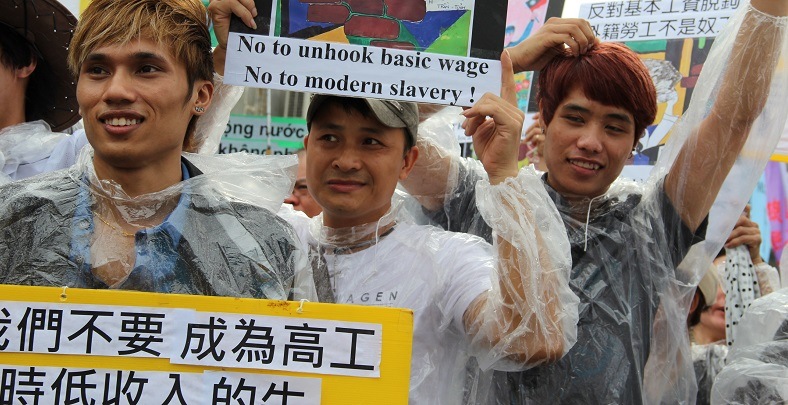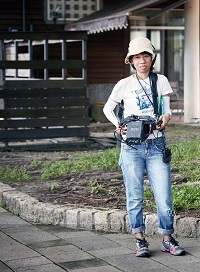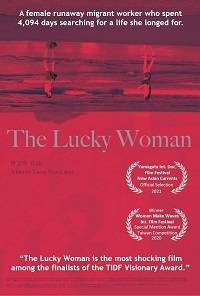There are now 710,000 migrant workers in Taiwan. Do these 710,000 people enjoy the same human rights as us?
Tseng Wen-Chen
Tseng Wen-Chen’s introduction and her work(s) distributed by Orient Indie Films.
The Origin
Q: “The Lucky Woman” is about migrant workers. Why did you want to choose this theme?
When I have feelings for a topic, I start shooting it. Because Thao Van and I are close in age, I started to think about as a woman, as a daughter or mother, how I view my identity and work. We had many conversations and echoes during this process. I myself have had many, many setbacks in creation, but this frustration seems to be nothing compared to her. I see that she is very strong, which gives me a lot of courage, and that’s why this film has been going on for so long.
Q: So the original plan was not to shoot this theme?
I originally wanted to shoot this, but because I had been shooting for a long time, from 2012 to 2018, and I was worried that these runaway migrant workers would be caught. There are many variables, so I was more active in the first half of the shoot. I was actually very anxious.
People often ask me, “When do you think you can finish the film?” I think about this almost every day, thinking about what to do with the film. I also wondered whether I was making the film to participate in the film festival or for what, and I kept asking myself this question every day.
Later, I felt that making documentary films actually made my soul more stable, and it was also a very meaningful thing for me. For example, the documentary I made a long time ago is still receiving copyright revenue. It means that people are still watching this film. I think this is the meaning. Therefore, I encourage myself that if I still have the strength, ideas, and spare energy, then I should be able to continue filming.
Q: How did you find the main characters in the first place?
Chang Cheng (currently the director of Radio Taiwan International) and Liao Yunchang (currently the director of Independent Opinion@CommonWealth Magazine), they first worked at the 4-Way Voice. At that time, Thao Van would submit articles to the 4-Way Voice, and Duy Hung would draw illustrations. This is how they knew each other. I spent roughly half a year building a trusting relationship with Thao Van.
The working pictures of migrant workers are actually the most difficult to capture. How to get the other party to agree to film? It’s really exhausting. During this process, I found that most of the Taiwanese I came into contact with were actually very kind. In fact, these people in the corners of Taiwan are actually very accepting of them. I think that arrogance and condescension are discrimination issues arising from this socio-economic status.
The problem with migrant workers is that they don’t have votes and the politicians don’t care about them. Taiwan is a country that claims so-called human rights. I really think that human rights have choices. There are now 710,000 migrant workers in Taiwan. Do these 710,000 people enjoy the same human rights as us?
Difficulties and Challenges
Q: How do you build trust with runaway migrant workers and employers?
It took me quite some time to gain the trust of the migrant workers. During Chinese New Year in 2013, I went to shoot Thao Van’s home in Vietnam, which was a very big breakthrough in my relationship with her. I originally heard Thao Van talk about the family members one by one. I heard that her brother and father were sick, and her younger sister was going to study. They were totally dependent on her to manage the whole family. I felt dubious, couldn’t imagine one person doing so much for her family.
At the beginning of the shoot, she seemed to be quite defensive, observing what kind of Taiwanese I was. At that time, she kept mentioning that she wanted to go home before the Chinese New Year. However, she could not make the trip due to her own situation. I suggested that I go to her house to have a look and did not expect her to agree. But she agreed, and I was quite happy. After that, she started chatting with me more. Then I realized that she already has a grandson and is a grandma!
It is necessary to go to her house. Why did she come to Taiwan to work? What is their poverty all about? I think this is more unimaginable for Taiwanese people. Later, I went to Vietnam with the cinematographer and the producer, a total of three people. When we left, our luggage was almost overweight as we brought a lot of gifts that Thao Van wanted to give to her family. Her employer at the time, Wang Hsiu-yun, also asked us to bring gifts, which shows that their relationship is actually very good.
When I arrived in Vietnam, I fully understood the family situation that Thao Van described earlier. Her family welcomed us very much, but at that moment I felt astonished – the person who spent New Year’s Eve with her family should be Thao Van herself, not me, a documentary filmmaker. I ate with her family, held her grandson, and her younger sister arranged for our four-day itinerary and transportation, and took great care of us. After coming back, we became very close.
In addition, it is not easy to go into the employer’s home to shoot. When I came back from Vietnam, I brought some things to visit the employer Wang Hsiu-yun’s house. We also showed the footage taken back from Vietnam to Thao Van and Ms. Wang. At first, we didn’t communicate specifically about the filming. However, in the last official visiting, Ms. Wang was willing to sit in front of the camera for an interview. This touched me deeply because not long after the filming, her physical condition deteriorated and she passed away in less than a month. I think she has quietly helped us to make the film.
The building of trust also comes from my desire to protect the identity of migrant workers. They were in an illegal state at the time, so I insisted that the film must wait for them to leave the country smoothly before it can be shown publicly to reveal their identities. Some people who are advocates of migrant workers think that the film should be completed and shown earlier in order to speed up the improvement of the situation of migrant workers. There was a time when I didn’t know when this film was going to be finished. I was also very anxious, but I knew this could not be helped, and it could only be like this.
Q: What was the biggest challenge during filming?
One of the biggest challenges is the language barrier. My approach is to let them speak first and then shoot if they feel they need to or want to ask something. I will pay attention to some keywords such as “Đài loan”, which is “Taiwan”. When I hear it, I think it may be related to the content of the film, and I will ask Thao Van what they are talking about now. During the shooting in Vietnam, in addition to Thao Van’s sister, there was a Vietnamese who came back from Taiwan to help us with on-site interpretation, but it was all roughly translated. I think if I could learn their language, I would have a more precise understanding.
In the case of language barriers, it takes a lot of time to review the material and edit it. It is a very complicated project, because double check is required. When the film was selected for the Yamagata Documentary Film Festival last year, I was asked to provide the Vietnamese transcript for accurate subtitle translation, so I proofread it again. Because the content and materials are too large, I can only do it myself, which is really hard.
Q: How did you allocate the weight of each character or the direction of the narrative in such a large amount of material?
In fact, the narrative part was very difficult to carry out because it took too long. Therefore, I changed to focus on themes. How do you make the escape understandable? Some people also asked me, “Then why does she want to run away?” It’s either that the working environment or living environment is too bad, or that she wants to make more money. Assuming that she can earn nine years’ money in five years, why doesn’t she run away?
The media called it a “blind spot for public security” because the escaped foreign workers did something. I actually see quite a lot of fleeing foreign workers working in a low-profile and serious manner, in order not to be prosecuted, so they will not deliberately do anything at all. Usually the easiest ones to get caught are the ones who have just escaped and they run away as soon as they see the police.
Others
Q: It seems that the huge exploitation of agency fees at the beginning is also a very fundamental problem that caused the escape?
The agency fee is US$6000-8000, which is 240,000 Taiwan dollars for us. The salary of working on their side is about a quarter of ours, so that 240,000 multiplied by 4 will be a big burden.
The money earned will also be 4 times the value back in Vietnam. Therefore, in the context of globalization, the labor force from these economically disadvantaged countries will move to those countries with better economic power, in order to earn a higher value from this economy.
Q: What do you hope to tell the audience or what kind of impact will this film have?
They come to Taiwan to work and expect a better life. This is human nature. So I hope that when you look at these migrant friends, you can be a little more compassionate. What touched me most was that I felt they were willing to give more to their families than I could have imagined. If we can feel this from the film, then I think we can see the migrant workers around us as our neighbors or friends. I think this kind of thinking can help improve the working environment and living environment of these migrant workers. Of course, this is a very complicated matter. It is a very structural problem when it comes to employers, intermediaries, and even the government.
Q: What is the meaning of the English film title The Lucky Woman*?
*The direct English translation of the Chinese title is The One Who Runs Away.
In fact, I hope that I can give Thao Van a blessing. I hope her life will be better after returning to Vietnam. Compared to in Taiwan, I think her life is relatively more stable. Her ability has also become very good now. She has experience in Taiwan. After returning, she plays a role like a switchboard in a travel agency. She has also done a good job in her career.
Q: You have mentioned that you and Thao Van have a lot of resonance in terms of identity and work experience. Can you talk more about this part?
The subjects I film are mostly women. Thao Van is just a few years younger than me. When people reach a certain age, they will have an understanding of some things. The topics that creators pay attention to may be related to themselves. I pay attention to women who are about my age.
For women like us, who work in pursuit of who they are, I find it incredible and admirable to see such selfless devotion to their families, and I am deeply attracted to them. I see a very strong motherhood in these new residents and migrant women, a motherhood that I don’t have.
I was struck by the fact that even if we were the same age, we were still thinking differently. I wonder how they think about life? What are they thinking about? How can they be so dedicated?
Thao Van once asked me a question, I think it is very interesting. She said: “I think you Taiwanese are very strange. You don’t take care of your parents by yourself. You have to find a lot of foreign workers and nurses like us to take care of them.” I didn’t know how to answer at that moment, and I still continue to reflect on it.
When I first saw the topic of “escape”, I wanted to explore the reasons for their escape and the injustice they faced afterwards through filming. However, after getting in touch slowly, what I saw was the character Thao Van, what she was thinking about and what her situation was.
I think it was the latter which supported me in filming for so long, otherwise I might not be able to take it after a year or two. Thao Van was originally a reporter in Vietnam and she came to Taiwan as a caregiver. However, she didn’t just settle for that role, and she would think about how to use her abilities. I think she is pursuing herself later. I shoot the escape in the beginning, and focused on the pursuit part later. I think it is this thing that attracts me to keep filming.
Sources: Women Make Waves International Film Festival、The News Lens
If you have any questions for director Tseng, leave a comment below. We will reach out to her and post her answer.
Subscribe now to watch The Lucky Woman online with 20% off! And stay notified about Asia-related insights & latest offers.



